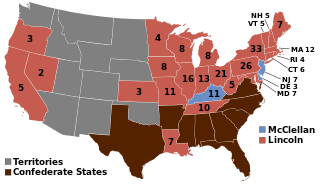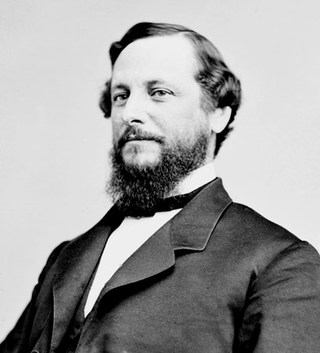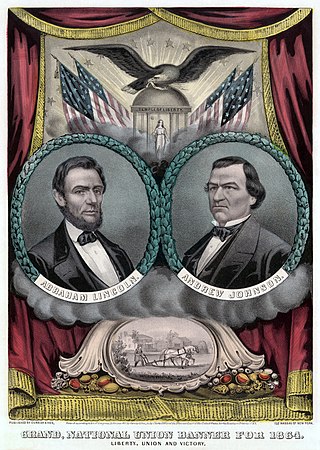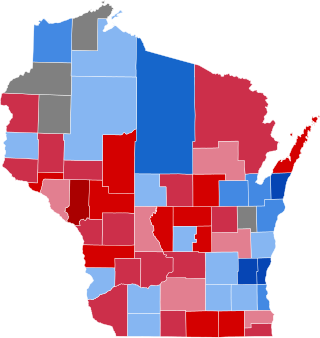
The 1864 United States presidential election was the 20th quadrennial presidential election. It was held on Tuesday, November 8, 1864. Near the end of the American Civil War, incumbent President Abraham Lincoln of the National Union Party easily defeated the Democratic nominee, former General George B. McClellan, by a wide margin of 212–21 in the electoral college, with 55% of the popular vote. For the election, the Republican Party and some Democrats created the National Union Party, especially to attract War Democrats.

George Hunt Pendleton was an American politician and lawyer. He represented Ohio in both houses of Congress and was the unsuccessful Democratic nominee for Vice President of the United States in 1864.

Horatio Seymour was an American politician. He served as Governor of New York from 1853 to 1854 and from 1863 to 1864. He was the Democratic Party nominee for president in the 1868 United States presidential election, losing to Republican Ulysses S. Grant.

The National Union Party was the name used by the Republican Party and elements of other parties for the national ticket in the 1864 presidential election during the Civil War. Most state Republican parties did not change their name. The name was used to attract War Democrats, border state voters, and Unconditional Unionist, and Unionist Party members who might otherwise have not voted for Republicans. The National Union Party nominated incumbent Republican President Abraham Lincoln of Illinois and Democrat Andrew Johnson of Tennessee for Vice President. They won the Electoral College 212–21.

The 1864 United States presidential election in California took place on November 8, 1864, as part of the 1864 United States presidential election. State voters chose five electors of the Electoral College, who voted for president and vice president.
War Democrats in American politics of the 1860s were members of the Democratic Party who supported the Union and rejected the policies of the Copperheads. The War Democrats demanded a more aggressive policy toward the Confederacy and supported the policies of Republican President Abraham Lincoln when the American Civil War broke out a few months after his victory in the 1860 presidential election.

The 1864 United States elections were held on November 8, 1864. National Union President Abraham Lincoln was elected to a second term, while the Republicans added to their majorities in Congress. The elections were held during the American Civil War. Lincoln would be assassinated shortly into his second term.

The 1864 United States presidential election in Wisconsin was held on November 8, 1864 as part of the 1864 United States presidential election. State voters chose eight electors to the Electoral College, who voted for president and vice president.

The 1864 United States presidential election in Vermont took place on November 8, 1864, as part of the 1864 United States presidential election. Voters chose five representatives, or electors to the Electoral College, who voted for president and vice president.

The 1864 United States presidential election in Massachusetts took place on November 8, 1864, as part of the 1864 United States presidential election. Voters chose 12 representatives, or electors to the Electoral College, who voted for president and vice president.

The 1864 United States presidential election in Maine took place on November 8, 1864, as part of the 1864 United States presidential election. Voters chose seven representatives, or electors to the Electoral College, who voted for president and vice president.

The 1864 United States presidential election in New York took place on November 8, 1864, as part of the 1864 United States presidential election. Voters chose 33 representatives, or electors to the Electoral College, who voted for president and vice president.

The 1864 United States presidential election in Ohio was held on November 8, 1864 as part of the 1864 United States presidential election. State voters chose 21 electors to the Electoral College, who voted for president and vice president.

The 1864 United States presidential election in Kentucky took place on November 8, 1864, as part of the 1864 United States presidential election. Kentucky voters chose 11 representatives, or electors, to the Electoral College, who voted for president and vice president.

The 1864 United States presidential election in Kansas took place on November 8, 1864, as part of the 1864 United States presidential election. Kansas voters chose three representatives, or electors, to the Electoral College, who voted for president and vice president.

The 1864 United States presidential election in Michigan took place on November 8, 1864, as part of the 1864 United States presidential election. Voters chose eight representatives, or electors, to the Electoral College, who voted for president and vice president.

The 1864 United States presidential election in Illinois took place on November 8, 1864, as part of the 1864 United States presidential election. Illinois voters chose 16 representatives, or electors, to the Electoral College, who voted for president and vice president.

The 1864 United States presidential election in Indiana took place on November 8, 1864, as part of the 1864 United States presidential election. Indiana voters chose 13 representatives, or electors, to the Electoral College, who voted for president and vice president.

The 1864 United States presidential election in Missouri took place on November 8, 1864, as part of the 1864 United States presidential election. Voters chose 11 representatives, or electors, to the Electoral College, who voted for president and vice president.

In 1868, the Democrats nominated former New York Governor Horatio Seymour for President and Francis Preston Blair Jr. for Vice President. The Seymour-Blair ticket ran on a platform which supported national reconciliation and states' rights, opposed Reconstruction, and opposed both Black equality and Black suffrage. Meanwhile, the Republican presidential ticket led by General Ulysses S. Grant benefited from Grant's status as a war hero and ran on a pro-Reconstruction platform. Ultimately, the Seymour-Blair ticket ended up losing to the Republican ticket of General Ulysses S. Grant and House Speaker Schuyler Colfax in the 1868 U.S. presidential election.





















